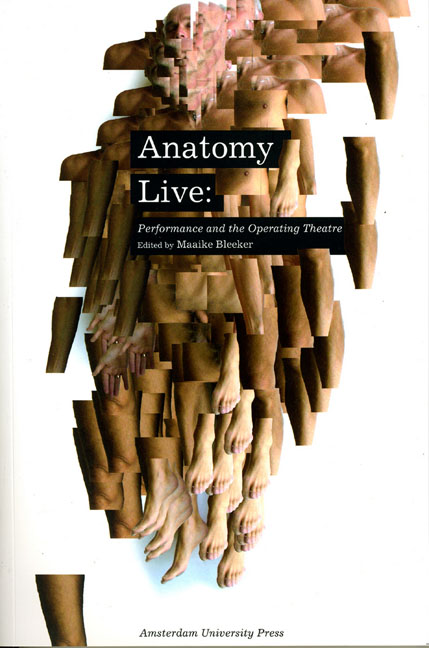Book contents
- Frontmatter
- Contents
- Acknowledgements
- Prologue - Men with Glass Bodies
- Introduction
- Performance Documentation 1: Holoman; Digital Cadaver
- Digital Cadavers and Virtual Dissection
- ‘Who Were You?’: The Visible and the Visceral
- Performance Documentation 2: Excavations: Fresh but Rotten
- The Anatomy Lesson of Professor Moxham
- ‘Be not Faithless But Believing’: Illusion and Doubt in the Anatomy Theatre
- Performance Documentation 3: De Anatomische Les
- Of Dissection and Technologies of Culture in Actor Training Programs – an Example from 1960s West Germany
- Ocular Anatomy, Chiasm, and Theatre Architecture as a Material Phenomenology in Early Modern Europe
- Performance Documentation 4: Camillo – Memo 4.0: The Cabinet of Memories – A Tear Donnor Session
- Martin, Massumi, and the Matrix
- Performance Documentation 5: Sensing Presence no 1: Performing a Hyperlink System
- ‘Where Are You Now?’: Locating the Body in Contemporary Performance
- Performance Documentation 6: Under My Skin
- Anatomies of Live Art
- Performance Documentation 7: Crash
- Restaging the Monstrous
- Delirium of the Flesh: ‘All the Dead Voices’ in the Space of the Now
- Performance Documentation 8: Körper
- Operating Theatres: Body-bits and a Post-apartheid Aesthetics
- Index
Prologue - Men with Glass Bodies
Published online by Cambridge University Press: 10 February 2021
- Frontmatter
- Contents
- Acknowledgements
- Prologue - Men with Glass Bodies
- Introduction
- Performance Documentation 1: Holoman; Digital Cadaver
- Digital Cadavers and Virtual Dissection
- ‘Who Were You?’: The Visible and the Visceral
- Performance Documentation 2: Excavations: Fresh but Rotten
- The Anatomy Lesson of Professor Moxham
- ‘Be not Faithless But Believing’: Illusion and Doubt in the Anatomy Theatre
- Performance Documentation 3: De Anatomische Les
- Of Dissection and Technologies of Culture in Actor Training Programs – an Example from 1960s West Germany
- Ocular Anatomy, Chiasm, and Theatre Architecture as a Material Phenomenology in Early Modern Europe
- Performance Documentation 4: Camillo – Memo 4.0: The Cabinet of Memories – A Tear Donnor Session
- Martin, Massumi, and the Matrix
- Performance Documentation 5: Sensing Presence no 1: Performing a Hyperlink System
- ‘Where Are You Now?’: Locating the Body in Contemporary Performance
- Performance Documentation 6: Under My Skin
- Anatomies of Live Art
- Performance Documentation 7: Crash
- Restaging the Monstrous
- Delirium of the Flesh: ‘All the Dead Voices’ in the Space of the Now
- Performance Documentation 8: Körper
- Operating Theatres: Body-bits and a Post-apartheid Aesthetics
- Index
Summary
Dr Nicolaes Tulp, surgeon and representative of the civil authority, anatomist and frequent office holder in the bourgeois government of Amsterdam. But also a general practitioner who, like Freud, left behind his casehistories, the Observationes, where the body is made text, and in which one of the patients is constrained to spend a winter in bed suffering from the insight that his bones were made of wax and would buckle if he stood up. The sick man was a painter to whom Tulp refers in a way that suggests it was Rembrandt, the most prolific producer of self-portraits ever, who was obsessed by the story of Samson and Delilah – that narrative of symbolic castration of treachery of women – and whose first important canvas depicted Tulp's magisterial dissection of the executed criminal Aris Kindt. At which event Descartes was probably present; anatomist himself, philosopher and legislator for modern subjectivity, who, mediating by the stove, considering strangely whether his body exists, uses the wax at hand to prove that corporeal objects have no consistency or essentiality but extension in space. And Caspar Barlaeus was almost certainly there at the dissection too, a leading intellectual and noted neurotic, who wrote poetry in praise of Tulp's dissection of Kindt, and dared not sit down for fear that his buttocks, which were made of glass, would shatter.
While in England, their brothers: Hamlet calling on his flesh to melt; Marvell, Member of Parliament, who let aggressivity write in his poem. And Milton and Pepys : each committed in their different ways to inexorable textuality; riven by equivocal desire. A revolutionary poet and censor, who also wrote a Samson, and a secret diarist narrating himself and his world in private. Both eventually blind…
But these are anecdotes and in some respects improbable, or at least not susceptible of proof. Surely not worth serious historical attention. And yet is there not something at once risible and haunting about a poet of the bourgeois class who thought that his body was made of glass (for Descartes, of course, strictly a madness); or salutary in an image of the public dissection of a man who had no respect for the law?
- Type
- Chapter
- Information
- Anatomy LivePerformance and the Operating Theatre, pp. 9 - 10Publisher: Amsterdam University PressPrint publication year: 2008



